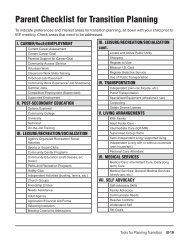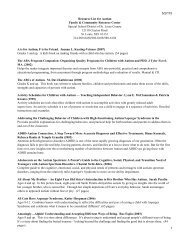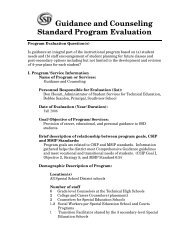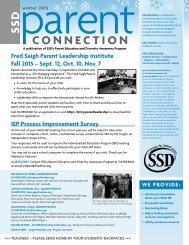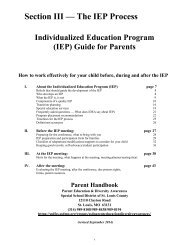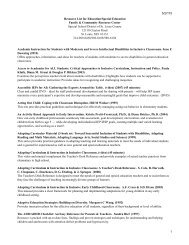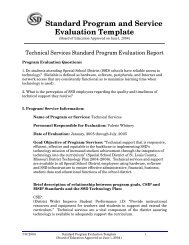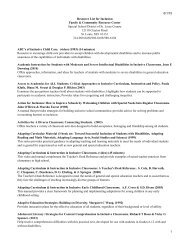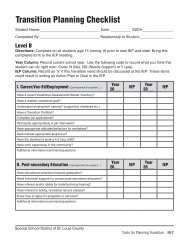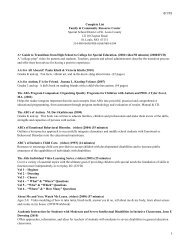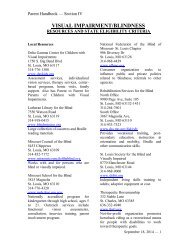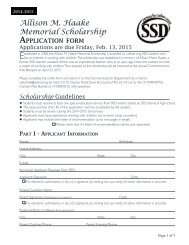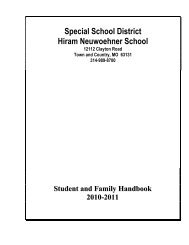Sec V Trans aug2012.pdf - Special School District
Sec V Trans aug2012.pdf - Special School District
Sec V Trans aug2012.pdf - Special School District
You also want an ePaper? Increase the reach of your titles
YUMPU automatically turns print PDFs into web optimized ePapers that Google loves.
• Any vocational training received• Whether your child receives SSI• Whether or not you can be reached by phone• City residents: Contact Project Casefind through the St. Louis Office for DevelopmentalDisability Resources for help with the application process. 314-421-0090Get medical and educational evaluations. They are important to identify yourchild’s strengths and needs.Begin therapy/intervention at the earliest age possible.Resources:• Missouri First Steps ProgramEarly intervention services for infants and toddlers, birth to age 3, who have delayeddevelopmentSt. Louis County314-453-9203Fax: 314-453-0802St. Charles County, St. Louis City314-453-9203Fax: 314-453-0802http://dese.mo.gov/se/fs/Explore school options — both public and private. Examine possibilities of inclusiveeducation.• County residents: Contact your local school district when your child is 2 years, 9 monthsold for a free evaluation. Your child must be referred from your local school district to<strong>Special</strong> <strong>School</strong> <strong>District</strong> of St. Louis County. SSD provides early childhood special educationservices in 15 of the 22 public school districts in St. Louis County – 7 of the local districtshave their own Early Childhood programs.• City residents: Contact the Office of <strong>Special</strong> Education when your child is 2 years, 6months old to set up an appointment for an evaluation.314-454-0010• Contact your Regional Office service coordinator to learn about and discuss the variousoptions.City: 314-244-8800County: 314-587-4800St. Charles County: 800-358-77655
Apply for Supplemental <strong>Sec</strong>urity Income (SSI). There are income and eligibilityrequirements, but it may be worthwhile to apply. Under age 18, the child’s eligibility is basedon the parents’ income, over age 18, self-eligibility.Resources:• Social <strong>Sec</strong>urity Administrationwww.ssa.gov800-772-1213Or, go to https://secure.ssa.gov/apps6z/FOLO/fo001.jsp to search for an office by ZIP code.The SSA Red Book serves as a general reference source about the employment-relatedprovisions of Social <strong>Sec</strong>urity Disability Insurance and the Supplemental <strong>Sec</strong>urity IncomePrograms for educators, advocates, rehabilitation professionals, and counselors who servepeople with disabilities. http://www.socialsecurity.gov/redbook/Take your child out into the community — restaurants, shopping, errands,entertainment, playgrounds, library, church and vacations. This is an excellent way for yourchild to learn appropriate behavior and just to have fun.Resources:• Recreation Council of Greater St. Louiswww.recreationcouncil.org/314-726-6044The Recreation Council serves as a "clearinghouse" for information on leisure, recreation andsocialization opportunities for individuals with developmental disabilities who reside in theGreater St. Louis Area. The council works to ensure individuals are aware of and haveaccess to activities and programs of their choice.Talk to your child about various jobs in the community.Have him or her participate in community-based instruction.Encourage your child to make choices and decisions.Encourage your child to volunteer in their community.Attend workshops on assertiveness and advocacy training. Parents generallyare their child’s best advocate. There are advocacy agencies in the community available tohelp you with a particular challenges.Resources:• Department of Elementary and <strong>Sec</strong>ondary Education (DESE)www.dese.state.mo.us• MPACT (Missouri Parents Act)www.ptimpact.org800-743-76346
• Legal Services of Eastern Missouriwww.mobar.org314-534-4200• Missouri Partners in Policymakingwww.mpcdd.com/page.php?contentID=52800-500-7878• Missouri Protection and Advocacy ServicesNo-charge for individual advocacy assistance when human rights are violated.www.moadvocacy.org/800-392-8667• Office for Civil Rightswww.ocr.gov•ParaquadCenter for Independent Living, advocacy for housing and disability policy, youth groupwww.paraquad.org/314-289-4200• <strong>Special</strong> <strong>School</strong> <strong>District</strong> of St. Louis County Parent Education & Diversity AwarenessInformation on current seminars, workshops, conferences and upcoming events.www.ssdmo.org314-989-8108 or 314-989-8460Get on mailing lists of organizations for persons with disabilities.Resources (Missouri):• MPACT (Missouri Parents Act)www.ptimpact.org800-743-7634Parent training and information center assists parents to effectively advocate for their child’seducational rights and services.• St. Louis Arcwww.slarc.org/314-569-2211Provides support and services to children and adults with developmental disabilities.• Life Skillswww.lifeskills-mo.org314-567-7705Serves persons with developmental disabilities with the major focus on adults.• Recreation Council of Greater St. Louiswww.recreationcouncil.org/314-726-6044 County residents314-772-2299 City residents7
Free quarterly newsletters; Summer Opportunities Guide.• College for Livingwww.paraquad.org/Programs/College/CollegeLiving.html314-289-4200Provides classes for persons with developmental disabilities age 18 and older.• APSE-MO (Missouri Chapter of the Association for Persons in Supported Employment)www.apse.mo• St. Louis Office for Developmental Disability ResourcesService Coordination also available314-421-0090• Governor’s Council on Disabilitywww.gcd.oa.mo.gov800-877-8249• Missouri Developmental Disabilities Resource Centerwww.moddrc.org800-444-0821• Missouri Planning Council for Developmental Disabilitieswww.mpcdd.com800-500-7878Resource (Out-of-State):• National Dissemination Center for Children and Youth with Disabilities (NICHCY)www.nichcy.org800-695-0285Become familiar with your local libraries.Resources:• St. Louis County Library Headquarters Branch1640 South Lindbergh Blvd.St. Louis, MO 63131 314-994-3300www.slcl.org/Books, periodicals and videos for families of individuals with developmental disabilities.• St. Louis City Public Librarywww.slpl.org314-241-2288• Family & Community Resource Center / <strong>Special</strong> <strong>School</strong> <strong>District</strong> of St. Louis County12110 Clayton RoadSt. Louis, MO 63131www.ssdmo.org/cool_tools/fcrc.html314-989-8460Books, videos, awareness materials, newsletters, and pamphlets.8
• St. Louis Children’s Hospital Family Resource Centerwww.stlouischildrens.org/content/familyresourcecenter.htm314-454-2350Subscribe to publications. There are a number of publications focusing on specificdisabilities.Resources:• ADDitude – Living Well with Attention Deficitwww.additudemag.com• Autism Asperger’s Digesthttp://autismdigest.com/• Autism Spectrum Quarterlywww.asquarterly.com/• Exceptional Parentwww.eparent.com/877-372-7368 (Toll Free)• Council for Exceptional Children (CEC) Parent Divisionwww.cec.sped.org703-620-3660• Mainstream Magazinewww.mainstream-mag.com/• Parenting <strong>Special</strong> Needshttp://parentingspecialneeds.org/currentissue• The <strong>Special</strong> Ed Advocate from Wrightslawwww.wrightslaw.com/subscribe.htmAccess respite care. A generous number of respite care hours are free to city and countyresidents, regardless of income. Respite care services are available in your home, in theprovider’s home, in residential centers, or in daytime centers.Resources:• St. Louis Family Support & Respite CoalitionFree pamphlet listing the various agencies that provide respite care 314-817-2270 (St. LouisArc ARCH office)• County Residents: Call your Regional Office case manager for referrals; or, if you don’thave a case manager yet, call the St. Louis Regional Office at 314-587-4800 and ask forintake.• City Residents: You are expected to have a Regional Office case manager in order toaccess respite care. If you don’t have a case manager and need crisis intervention or generalinformation, call the St. Louis Office for Developmental Disability Resources at 314-421-0090.9
Attend workshops on IEP planning.Resources:• <strong>Special</strong> <strong>School</strong> <strong>District</strong> of St. Louis Countywww.ssdmo.org/cool_tools/workshops.html314-989-8108 or 314-989-8438 or 314-989-8194• MPACT (Missouri Parents Act)http://ptimpact.org/Training/Training.aspx800-743-7634• St. Louis City Public <strong>School</strong>sContact your school counselor or resource teacher at your local school for workshopofferings and resource directory.• Office of Developmental Disabilities Resources Education Advocate314-421-0090• Ask for Education CoachGo to your child’s IEP with your own specific goals tailored to his/her needs. Inviteknowledgeable, supportive advocates, such as your Regional Office case manager, parentadvocate, family, friend, or student peer who is non-disabled.Begin estate planning. Keep your will/trust up-to-date. Keep current with related federaland state legislation. Be certain your attorney is aware of current legal precedents impactingpersons with disabilities (e.g., Tidrow trust). Do some good basic reading on estate planningprior to visiting your lawyer.Resources:• Midwest <strong>Special</strong> Needs Trustwww.midwestspecialneedstrust.org573-882-3388 or 888-671-1069•Funding a special needs trust:http://www.specialneedsanswers.com/resources/article.asp?id=5622Help your child explore self-advocacy skills - to learn to speak for him- or herselfin school and in the community, make decisions and solve problems. It is important to helpyour child understand his or her strengths and needs and to be able to express them to others.Students at an early age can attend a part of their IEP and have input into the plan, which willhelp give them gain self-confidence. See ―III. At Age 14 to 16‖ below for specific selfadvocacyactivities for your child when he or she is a little older.Encourage your child to utilize assistive technology - (computers, cell phone,pager, communication devices, car modifications, etc.).Resources:10
• Missouri Assistive Technologywww.at.mo.gov816-655-6700 or 800-647-8557 (in state only)• The Enabling Mobility Centerhttps://enablemob.wustl.edu/EMC/emc.htm314-289-4202• Local <strong>School</strong> <strong>District</strong>sYour school district has certain obligations under federal law to provide assistive technologyfor your child when needed to provide a free appropriate public education (FAPE). Eachdecision must be made on a case-by-case basis based on the educational needs of your child.If your child’s Individual Education Program (IEP) team determines that he or she needssome type of assistive technology in order to receive FAPE, the child’s IEP must contain aspecific statement of such services.Encourage and reinforce your child’s friendships and social networks.Explore weekend and summer activities to promote independence; camp can be a valuableexperience. Foster good general health and physical activity, which develop stamina for theextended work world.For all three of the above recommendations, contact the Recreation Council of Greater St.Louis and request a copy of their free ―Guide to Leisure Services,‖ which gives acomprehensive, descriptive listing of recreation activities in the St. Louis area. Services listedcomprise both those specifically designed for people with disabilities, as well as programs forthe general public that include people with disabilities.Resources:• Recreation Council of Greater St. Louiswww.recreationcouncil.org/County Residents and TDD users - 314-726-6044City Residents - 314-772-2299•SSD Parent Education Workshopshttp://www.ssdmo.org/cool_tools/workshops.html314-989-8108Give an allowance. Begin banking, budgeting and purchasing experiences.Stress reading, telling time, money, computer skills and math skills as possible. Read to thechild who can’t read.Be attentive to the needs of your other children as well. Sibling workshops areoften helpful.Resources:11
• St. Louis Arcwww.slarc.org/314-569-2211Groups for ages 6 to 11 and 12 to 15.• Life Skills/TouchPoint Autism Services314-567-7705Groups for ages 7 through 12.II. AT AGE 13:(In addition, see all previous recommendations)Begin formal person-centered planning. Set preliminary goals for post-schooloutcomes for employment, living arrangements, education, recreation and leisure. Contactyour child’s Regional Office service coordinator or DD Resources service coordinator.Be sure your child has begun to learn community access skills, such as using publictelephone, public transportation, community recreation, ordering from a menu, locatingpublic restrooms, keeping safe.Resource:• SSD <strong>Trans</strong>ition Guidebook: Through the Doorway to Adult Life (see<strong>Sec</strong>tion III – Tools for Planning <strong>Trans</strong>ition - ask your child’s teacher for a copy or downloadfrom the SSD website: http://www.ssdmo.org/step3.html (click on SSD <strong>Trans</strong>itionGuidebook under <strong>Trans</strong>ition Tools).Prepare your child for social/sexual development. Know that your son ordaughter will not be a child forever and prepare to give understanding and support.Continue to talk about career paths and choices for the future. Soon the school will bedeveloping a four-year personal plan of study that will prepare him/her to meet the postsecondary goals and spending time now to discover possible goals will provide a betteropportunity for success.Resources:• Parent Education and Diversity Awareness of <strong>Special</strong> <strong>School</strong> <strong>District</strong>314-989-8108 or 314-989-8438 or 314-989-8194III. AT AGE 14 TO 16:(In addition, see all previous recommendations.)12
Prepare for your child’s <strong>Trans</strong>ition Plan, which will become a part of hisor her IEP at age 16. Set specific, individual goals of substance. Include communitybasedvocational instruction (CBVI) in the <strong>Trans</strong>ition Plan of the IEP. Look into ―naturalsupports.‖ If none of the existing programs meet your child’s needs, consider designingopportunities, volunteer/job training/work experience programs in your community and askthe service provider agencies to implement the plans.Resources:• St. Louis Public <strong>School</strong>sOffice of <strong>Special</strong> Education314-454-0010• <strong>Special</strong> <strong>School</strong> <strong>District</strong> of St. Louis County314-989-8100• Summer Work Experience Programs (SWEP)The mission of the SWEP Program is to provide a meaningful work experience that willassist students in a smoother transition into the world of work. SWEP is designed to providethe experience of working to those who have limited or no work experience or who needextra support in being successful on the job. Contact your child’s special education teacher.Continue to encourage your young adult to explore self-advocacy skills tolearn how to speak for him or herself, to make decisions, solve problemsand contribute to the community.Resources:•Fred Saigh Youth Leadership Program (St. Louis County students with disabilities -contact your child’s SSD teacher)• MPACT (Missouri Parents Act)www.ptimpact.org800-743-7634•Paraquad Youth Grouphttp://www.paraquad.org/314-289-4200• People First314-289-4220• SSD Parent Education & Diversity Awareness workshopswww.ssdmo.org/cool_tools/workshops.html314-989-8108 or 314-989-8460• SSD websitewww.ssdmo.org/step3/explore_iep_selfadvocacy.htm13
Family’s Role in <strong>Trans</strong>ition Planning. Advocate for a curriculum that will prepareyour student for work and community. Include goals for community job training if neededfor your child.Investigate post-secondary education options with your son or daughter. Get informationabout admissions requirements, accessibility, adaptations and supports.Communicate the value of work to your son or daughter.Get to know state and local decision-makers.<strong>Trans</strong>ition StepsBefore the IEP Futures plan (Optional) <strong>Trans</strong>ition Planning Checklist Make sure all required participants are at the IEP meeting and any extra agencies youwant to be there. Make sure you have received an age of majority letter by your student’s 17 th birthday Ask about other assessments that may be neededDuring the IEP Complete present levels of performance with your students’ and your input. Identify a post-secondary goal. Complete form C of the IEP. This is the transition formused for students who are turning 16 or are 16 and above. Complete the special considerations page Help to develop goals and action plans, especially related to the post-secondary goal.After the IEP Ask if a portfolio has been started and, if not, ask that one be developed. Ask for linkages to different agencies: St. Louis Regional Center; recreation and leisure;Vocational Rehabilitation; supported employment agencies, to name a few.Ongoing Follow up whenever you feel your young person’s needs are not being met. Keep encouraging that your son or daughter take an active role in the IEP and transitionplanning. Ask the teacher to explore Self-Determination and how that can be inserted into theirdaily activities.Attend workshops on transition planning. Learn what options are currentlyavailable, as well as what new, cutting-edge ideas are being tried in other parts of thecountry.Resources:14
• MPACT (Missouri Parents Act)http://ptimpact.org/800-743-7634• SSD Parent Education & Diversity Awarenesswww.ssdmo.org/cool_tools/workshops.html314-989-8108• St. Louis Public <strong>School</strong>sTalk to your resource teacher or school counselorInvestigate summer volunteer experience. Use your imagination to come up withsummer volunteer opportunities, which are valuable job training for your teenager. Hospitals,adult day care centers, not-for-profit organizations. Child day care centers are among thepossibilities. In some cases a family member or other non-professional may need to ―jobcoach‖ the young adult to begin with or for the entire time.Resources:• United Way Summer Volunteer Guide for Youthwww.stl.unitedway.org/volunteer.aspx314-539-4299• St. Louis Arcwww.slarc.org/314-569-2215Look into summer work experience beginning at age 16. Most summer jobsexpect the applicant to have basic job skills. Some offer job skill training.Resources:• Summer Work Experience Program (SWEP) – contact your child’s SSD teacher• St. Louis Agency on Training & Employment314-589-8000Apply for a Missouri ID card or driver’s license at a Missouri LicenseBureau Office at age16.Resource:• Missouri Department of Revenue Driver’s Guidehttp://dor.mo.gov/forms/Driver_Guide.pdfExplore service providers for adults to see what options exist for bothemployment and residential living. Contact your Regional Office service coordinatorfor a complete listing of adult service providers for both employment and residential living orgo online and download the SSD Resource Directory from https://www.ssdmo.org/step3.html(Click on SSD Resource Directory under <strong>Trans</strong>ition Tools.) Start making calls and visiting15
providers. Begin to develop your own on-going assessment of what is and isn’t out there.Keep notes on names and phone numbers as you continue to build a network. Talk toexperienced parents.Resources:• SSD Resource Directory for <strong>Trans</strong>ition Related Services for Persons with Disabilitiesin the Greater St. Louis Area - contact your child’s IEP chairperson for a copy• Parent Education & Diversity Awareness314-989-8108 or 989-8460• SSD Website – Step # Planning for Adult Lifehttp://www.ssdmo.org/step3.htmlIV. AT AGE 18:(In addition, see all previous recommendations.)Apply for Supplemental <strong>Sec</strong>urity Income (SSI) and Medicaid and/orMedicare. Eligibility at age 18 is based on child’s income only.Resource:• Social <strong>Sec</strong>urity Administration1-800-772-1213Make education ongoing - continue reading to the child who can’t read, explorecontinuing education programs, technical training colleges, community colleges, and collegeprograms with resources to support students with disabilities.Resources:• Paraquad/College for Living314-289-4200Basic academic and living skills classes for students ages 18 and over with developmentaldisabilities, and a supported education program where students access programs with avolunteer support person at community education centers.• St. Louis Community Colleges, Access Office Continuing EducationFlorissant Valley 314-513-4444 or 513-4549Forest Park 314-644-9260 or 644-9174Meramec 314-984-7673 or 984-7704Access offices provide accommodations for students with disabilities who wish to enroll inthe existing credit program or non-credit continuing education classes.• SSD Resource Directory for <strong>Trans</strong>ition Related Services for Persons with Disabilitiesin the Greater St. Louis Area - contact your child’s IEP chairperson for a copy or go onlineand download the SSD Resource Directory from https://www.ssdmo.org/step3.html (Click onSSD Resource Directory under <strong>Trans</strong>ition Tools.) Under post-secondary education look for<strong>Trans</strong>itional Post-<strong>Sec</strong>ondary Programs and Post-<strong>Sec</strong>ondary Programs for Students with16
Intellectual Disabilities• MO-AHEAD - The Missouri College Guidebook and College Profileswww.moahead.org/guidebook/guidebook.htmlMake arrangements for your young adult to register to vote.Resource:• Board of Election Commissionerswww.stlouisco.com/YourGovernment/Elections/VoterRegistrationCounty: 314-615-1800http://stlelections.comCity: 314-622-4336More than 600 registration sites including most city halls, libraries and schools in addition to<strong>Special</strong> <strong>School</strong> <strong>District</strong> facilities, local branches of the Community College <strong>District</strong>s, theUniversity of MO-St. Louis, and various businesses, union halls and churches.Make arrangements for your son to register for the draft (required)Resource:• U.S. Post Office - any branch•Register online: http://www.sss.gov/regist.htmKeep in touch with your Regional Office service coordinator and makesure your case is active. Invite your service coordinator to IEP and transition planmeetings. Discuss plans for your young adult’s future and gather as much specificinformation about transition to adult life from your service coordinator as possible.Revisit service providers for adults to see what new options exist for employment andresidential living. Some major service providers are listed on previous pages. Contact yourRegional Office service coordinator for a complete listing or visit www.plboard.com foradditional resources.Request that community based vocational instruction be a major component of the IEP.Become familiar with Vocational Rehabilitation (often referred to as DVR, VR, or VocRehab). Apply for services a full year before your adult leaves school.Resource:• Regional Office / Missouri Division of Developmental Disabilitieshttp://dmh.mo.govSt. Louis County Office 314-587-480017
• Vocational Rehabilitationhttp://dese.mo.gov/vr/vocrehab.htmNorth: 314-475-7999South: 314-877-1900West: 314-587-4877Learn about the implications and levels of guardianship. Full or even limitedguardianship is not for every family. Talk with parents who have dealt with the issue ofguardianship. Get perspectives from both sides. Once guardianship is granted, it is not easyto reverse.Resource:• Missouri Guardianship Online Workbook and Missouri Guardianship: A ResourceGuide at the Missouri Development Disabilities Resource Center website:http://www.moddrc.org/Check on health insurance coverage for your child. See if your son or daughtercan continue to be covered under your policy. Some insurance companies require anapplication for a dependent child with a disability to be submitted before the child reachesage 19.One or two years before graduation initiate or update Futures Plan withschool.Resource:• SSD <strong>Trans</strong>ition Guidebook: Through the Doorway to Adult Life (see <strong>Sec</strong>tion III –Tools for Planning <strong>Trans</strong>ition - ask your child’s teacher for a copy or download from theSSD website: http://www.ssdmo.org/step3.html (click on SSD <strong>Trans</strong>ition Guidebook under<strong>Trans</strong>ition Tools)V. AT AGE 20 (or year of leaving school):(In addition, see all previous recommendations.)Check with Regional Office to be sure your case is active. Invite your child’sservice coordinator to the IEP meeting. Discuss which adult service agencies your child willbe utilizing and make contact with those agencies to enroll in service or open an active file.Coordinate with your service coordinator to develop and update a person centered plan on ayearly basis. Ensure that the plan includes future support needs, resources and meets yourchild’s post-secondary goals.18
Contact Vocational Rehabilitation (VR). Apply for a counselor and makearrangements for assessments. Determination of eligibility can take 60 days, and assessmentscan take up to six months.Resource:• Vocational Rehabilitation9900 Page Avenue, Suite 104St. Louis, MO 63132http://dese.mo.gov/vr/vocrehab.htm314-587-4877Other office locations are listed on the website.Invite your VR counselor to attend your child’s IEP. Ask for input and discuss work options.Choose a vocational training or supported employment agency with the help of a VRcounselor. Begin the process toward job development, which can take a year or more.Brainstorm for possible job leads. Use your family, friends, business associates and yourchild’s futures planning group. Network with community contacts as you take an active rolein job development for your child.Investigate transportation options. Learn about bus training and publictransportation. Check with your Regional Office service coordinator for options. Life Skillshas a transportation specialist to help you plan appropriate options for your child. Inquireabout Para-transit Card (ADA) to access Call-A-Ride.Resources:• Life Skills314-567-7705• St. Louis Society314-989-1188 ext.13• Metro - for application for Metro Discount Card or ADA application.www.metrostlouis.org314-982-1510•Mercy Medical Center – Head Injury Resourceassessment314-432-8300- Driver evaluation, training &Continue to increase independence and interdependence throughsocialization activities.Resource:19
• Recreation Council of Greater St. Louis - free ―Guide to Leisure Services‖ and quarterlynewsletters:www.recreationcouncil.org/City: 314-772-2299County: 314-726-6044St. Charles: 636-922-8313Continue to plan for future living arrangements for your young adult,either in supported or independent living. Families need to continue to take anactive, assertive role in exploring what options are available by checking out agencies thatoffer residential services, and in coming up with creative solutions to individual situations.Take advantage of the networks you have been building with other parents and advocatesthrough support groups, schools, etc. Talk both with parents who have already foundresidential answers for their children and with those who are in the process of exploringvarious options.Talk seriously with your own immediate and extended family about visions, goals, andpractical steps toward the continuing journey on the road of transition. Include your youngadult with a disability in the discussions.A note to families of individuals needing residential living arrangements with 24-hour―protective oversight‖: All community placement programs are funded by the Department ofMental Health. Funding is limited for these services. Critical and emergency cases takeprecedence for placement and there are often more critical cases than funds to cover them.In spite of these statistics, it is a good idea to talk to your Regional Office service coordinatorabout community living options. Continue to stay in contact with your service coordinator incase an unexpected emergency occurs.Your service coordinator can also be a resource for social services that can make living athome easier for your child and you.A note to families of individuals who need only ―planned intermittent support‖ and havesome financial resources: You can start with your Regional Office service Coordinator orcontact a lead agency directly. Your service coordinator should have a complete list ofagencies. Your young adult will need to be able to live independently with limited assistance,and have a job or other resources to be able to pay all or most of the rent and utilities.Exit the school system with an updated Futures Plan. Hang in there!20
TYPES OF TRANSITIONS<strong>Trans</strong>ition means change from one educational program or setting to another educationalprogram or setting. <strong>Trans</strong>itions will occur several times while your child is in school. Some ofthese types of transitions are listed below:•From infant/toddler program to preschool program.Tips:•Begin planning at least six months before the child is moved;•Work with the teachers and service providers in the new setting;•Ask questions that will help you and your child prepare for this change;•Tell the teachers about your child (communication, medical needs, etc.);•If possible, make a videotape at one setting to take to the new one.•From preschool to kindergarten/elementary. This involves your child going from a homecare or preschool program to a regular school setting.Tips:•Visit the school ahead of time so your child knows where he will be going to school;•If possible, meet your child's teacher and let your child visit his classroom before school starts;•Meet with your child's new teacher to discuss his needs and your concerns or ideas abouthis education.•From elementary school to middle school. This may involve changing schools and/or goingfrom a smaller to a larger school.Tips:•Talk to your child about making new friends;•Answer any questions your child may have about his new school;•Visit the school and discuss any concerns or ideas;•Help make students, teachers and other parents aware of students with disabilities.•From middle school to high school. Your child may now change classes and have manydifferent teachers. Peers may become increasingly important for your child. Extracurricularactivities provide good opportunities for your child to be with his peers.Tips:•Visit the school and find out what activities will be available for your child;•Arrange a meeting with all the teachers so you can explain your child's needs;21
•Take your child to school to meet his teachers before school starts.•After high school. At the time your child turns 16, the law requires that a transition plan bewritten as part of his or her individualized education plan (IEP).Action plans and IEP goals must address some of the following transition areas if applicableto the student’s needs:InstructionRelated servicesEmploymentEducation and/or trainingCommunity experiences, such as shopping, housing options and public transportationIndependent livingFunctional vocational evaluationThe transition plan must also include referral to appropriate agencies such as vocationalrehabilitation or supported employment.Remember, the Americans with Disabilities Act (ADA) gives persons with disabilitiesspecific rights in terms of employment and where they may chose to live.Tips:•Plan as far ahead as possible for your child's transition after high school;•Let your child get used to his new place to live or work gradually;•Be prepared with an alternative plan if a residence or job placement is unavailable;•Involve your child in planning for his future.22
SSD TRANSITION OPTIONSFOR STUDENTS AGES 17 TO 21Option 1:After graduation with diploma:Students can meet graduation requirements by completing IEP goals or by achieving therequired graduation credits from the high school.Work (with or without support from the Vocational Rehabilitation/Rehabilitation Services forthe Blind)College/Technical <strong>School</strong> (with or without support from the VocationalRehabilitation/Rehabilitation Services for the Blind)Note: After graduation with a diploma, the student is no longer eligible for services under theIndividuals with Disabilities Education Act (IDEA), but may have some rights under <strong>Sec</strong>tion504 of the Rehabilitation Act and the Americans with Disabilities Act.Some students may attend graduation exercises at their high school, but their diploma isdeferred until they get work experience or life skills, as determined by the IEP committee.Option 2:The student may still need to meet IEP transition goals or enroll in courses to completerequirements for graduation. This is an IEP decision and may occur until age 21. After fouryears of high school, students may remain in school until age 21 if they have not graduatedwith a diploma. The student with a disability who begins the school year at age 20 may finishthe school year even though he or she turns 21 during that school year.Before graduation, these additional programs are available that may meet the student’stransition needs:ATC: Access to CollegeThe Access to College Program (ATC) began in 2010 as a pilot program between SSD, withFerguson-Florissant <strong>School</strong> <strong>District</strong> and St. Louis Community College at Florissant Valley.ATC is a program for second-semester seniors with disabilities who want to experience23
transition to college in a supportive and encouraging environment.Students enroll in two courses:Access to College course - Students receive one elective high school credit. Topics includeself awareness, career planning, understanding your disability, self advocacy, obtainingaccommodations in college, understanding your rights and learning about adaptivetechnology. The experiences provided in this class provide the student with the knowledgeand skills needed to successfully transition from high school to college.Orientation to College course - Students receive one hour of elective college credit. Thecourse teaches students strategies to achieve success in college. Students develop collegelevelstudy skills such as note taking, test taking, effective listening and reading strategies.Students also learn how to access resources that will assist them in college.Vocational Skills Program (formerly Community-Based <strong>Trans</strong>ition Services, CareerTraining Program and NEXT/PREP Programs)<strong>Trans</strong>ition from school to adult life must be addressed in the Individualized EducationProgram (IEP) beginning at age 16, and earlier if appropriate. Often, students are prepared atthe time of graduation from high school to meet their post-secondary goals for employment,education and independent living. However, when a student has attended four years of highschool and still has transition needs in order to successfully meet post-secondary goals, thenhe or she may be considered through the IEP process for Community-Based <strong>Trans</strong>itionServices.The mission of Vocational Skills Program is to provide a continuum of supports and servicesto students and families to assist the students in gaining skills needed to achieve realistic andmeaningful post-secondary goals.Vocational Skills Program are provided at one of the many community-basedclassrooms/work sites that are located within three zones.ZONE 1 (Affton, Bayless, Brentwood, Clayton, Hancock Place, Kirkwood, Ladue,Lindbergh, Maplewood-Richmond Heights, Mehlville, Valley Park, and Webster Grovesschool districts)Kim Meyers, director: 314.989.8205Marilyn Smith, <strong>Trans</strong>ition EPS: 314.989.8741Anne Lund, <strong>Trans</strong>ition Facilitator: 314 989.882824
ZONE 2 (Parkway, Ritenour, and Rockwood school districts)Dee Byrnes, director: 314.989.8585Jeff Schneider, <strong>Trans</strong>ition EPS: 314.989.8271TBA, <strong>Trans</strong>ition Facilitator: 314.989.8827ZONE 3 (Ferguson-Florissant, Hazelwood, Jennings, Normandy, Pattonville, RiverviewGardens, and University City school districts)Carla Addoh, director: 314.989.8422Leslie Caldwell, <strong>Trans</strong>ition EPS: 314.989.8264Sandy Kempf, <strong>Trans</strong>ition Facilitator: 314.989.8829To assist the zone leadership team with assigning Community-Based <strong>Trans</strong>ition Services,parents are asked to complete and return a Parent/Student Survey to the case manager beforeor at the time of the IEP meeting.CBVI: Community-Based Vocational InstructionCommunity-Based Vocational Instruction (CBVI) is designed to help high school studentslearn work behaviors in a real-work environment. Students who have post-secondary goals foremployment who need to learn appropriate work behaviors in a real-life setting and will needsupported employment are eligible for this program. Worksites are developed close to thehigh school. <strong>Trans</strong>portation to the worksite is provided by SSD or Metro and students areaccompanied by a teacher and teacher assistant. Students may spend anywhere from one tofive days per week at the worksite for a specified amount of time. Teachers record studentprogress on work skills and appropriate behaviors or soft skills that are needed in order to besuccessful in meeting post-secondary goals for employment. SSD currently has CBVIprograms in more than 100 local businesses.Graduation requirementsAccording to the state of Missouri, a student with a disability may graduate if:IEP goals and objectives, as measured by the evaluation procedures and criteria specifiedin the IEP are met, orBy taking and passing regular courses with or without modificationAfter meeting local graduation requirements and receiving a diploma, a student maychoose to:o Work with or without support from Vocational Rehabilitation (VR) orRehabilitation Services for the Blindo Attend a college, university, community college, or vocational or trade schoolwith or without support from the VR or Rehabilitation Services for the Blindo Participate in a day program or volunteer in the community25
COOP: Cooperative Work ExperienceThe Cooperative Work Experience program (COOP) is available to qualifying high schoolstudents with disabilities whose IEPs indicate the need for work experience in a competitivesetting and who also are eligible as clients of VR. Program goals include acquiring generalskills related to performing work under supervision, as well as job-related skills.COOP offers students:The opportunity to earn elective credit toward graduation for their workThe opportunity to be released from school for at least one hour per daySupervision by the Work Experience Coordinator (WEC) from the school who willassign credit based on hours worked and provide off-campus supervisionAn opportunity to find entry-level employment prior to graduationSupport for increasing their ability to find and hold jobsMotivation to stay in schoolThe opportunity to earn up to four units of elective credits during the school year for offcampuswork experienceParticipants in COOP must be:Enrolled in a school where there is a certified WEC and COOP agreementAt least 16 years old and have an IEPCertified eligible by VRAble to find their own transportation to and from workCompetitively employedAble to turn in pay stubs to the WECEnrolled in or be receiving related instructionFor more information about the COOP or to explore the possibility of applying, speak to thecase manager during the IEP meeting. Decisions about enrolling in the COOP should be madeat the IEP meeting well in advance because the certification process for VR may take up to 60days to complete.26
PERSONAL FUTURES PLANNINGPersonal Futures Planning is the identification of personal dreams and goals and thedevelopment of an ongoing strategy that makes those dreams and goals a reality. As peoplechange and grow, so do their goals. Personal futures planning is what we do every day whileteaching, loving and meeting the needs of our children.CRITICAL COMPONENTS OF A PERSONAL FUTURES PLAN:• It’s never too early (young) or too late (old) to begin to plan for the future.• If possible, ask the person with disabilities what his personal dreams or visions are for hisor her future.• In the case of a young child or someone who can't communicate his wishes, ask thefamily or ask yourself what would someone without a disability want? Where does he want tolive, work and play?• Focus on capabilities and talents. Most of the time we cannot "fix" a disability, but wecan identify strengths.• Focus on what the person CAN do — not on what he cannot do.• Meet with the planning team to review and revise plans on a regular basis.You can contact the <strong>Trans</strong>ition Effective Practice <strong>Special</strong>ists at SSD regarding assistance witha personal Futures Plan for your son or daughter. Call 989-8741.27
SSD TRANSITION GUIDEBOOK &RESOURCE DIRECTORYDo you wonder what your child will do after high school? What are the choices available foryoung people for further education or training, employment, recreation and livingarrangements? How do you help your child make these choices?Families who begin the process of dreaming, exploring the options and resources, andplanning early in the school age years, feel the most comfortable about this transition intoadult life at graduation time. <strong>Trans</strong>ition planning is a right guaranteed by law to ensure thatstudents are prepared for life after school and it should involve students, families, school staffand personnel from adult service providers whom the student may rely on for services.<strong>Special</strong> <strong>School</strong> <strong>District</strong> has published a guidebook and directory for the transition planningprocess to be used by students and their families and teachers.Here is what you'll find in the <strong>Trans</strong>ition Guidebook — Through the Doorway to Adult Life:1. An introduction to what transition planning is all about.2. Information on guardianship and estate planning.3. Tools for planning transition – checklists, worksheets, surveys and questionnaires.4. Individualized Education Programs (IEP) involving <strong>Trans</strong>ition Plans. How transitiongoals and objectives can be part of the IEP in <strong>Special</strong> <strong>School</strong> <strong>District</strong>. Also included arethe relevant resources within SSD.5. Toward Successful <strong>Trans</strong>ition – A Checklist for the First 21 Years (included earlier inthis document).6. Additional services and resources for transition at <strong>Special</strong> <strong>School</strong> <strong>District</strong>.In the Resource Directory: <strong>Trans</strong>ition Related Services for Persons with Disabilities inthe Greater St. Louis Area you’ll find the extensive services and resources that areavailable in our community. This will give you a start on becoming familiar with theavailable options and supports.The <strong>Trans</strong>ition Guidebook and Resource Directory, or the sections you feel would bemost helpful right now, can be accessed on the SSD website at www.ssdmo.org/step3.htmlunder ―<strong>Trans</strong>ition Tools‖ or through the Family & Community Resource Center, 989-8460,or your child's teacher.The earlier transition planning begins for a student, the better the outcome.28
ADULT SERVICESSome students with disabilities are not ready for independent living or employment when theirschool experience ends. There are agencies in the community that provide services to studentswith disabilities following their graduation from school. For additional information, see step 3on the SSD website at www.ssdmo.org/step3.html or the <strong>Trans</strong>ition Resource Directory.GOVERNMENT SUPPORT SERVICESThe St. Louis Regional Office, an agency of the Missouri Department of Mental HealthDivision of Developmental Disabilities, serves a four-county area that includes St. Louis City,St. Louis County, St. Charles County and Jefferson County. Most public services for adultswith intellectual and physical disabilities are delivered through the Regional Office.To be eligible for services from the Regional Office, your child must have a mental and/orphysical disability that is manifested prior to the age of 22 and is likely to continueindefinitely and result in functional limitations in two or more major life areas (i.e., self care,language, self-direction, capacity for independent living or mobility).The Regional Office provides case management services that consist of assessing needs,identifying priorities, identifying a plan, procuring services through referral or actualpurchase, providing advocacy, monitoring appropriateness of services and reevaluation ofneeds. Services may include family support, counseling, therapies and residential services.To apply for services, the applicant or the applicant's legal guardian should contact 314-877-2711 and asks for the Intake Department. Eligibility is determined during this initial process.Individuals who are eligible for services are assigned a case manager. NOTE: Once eligible, itis important to remain active and in touch with the assigned case manager.Contact: 314-587-4800 (Intake Department) or http://dmh.mo.gov/dd/facilities/St. Louis Office for Developmental Disability Resources offers services to St. Louis Cityresidents with developmental disabilities. This office is responsible for administration of citytax dollars for services for persons who are developmentally disabled. Funding goes toestablish, expand and provide a variety of programs and services. Respite coordination isavailable.Contact: 314-421-0090 or www.mrdd.org/Social <strong>Sec</strong>urity Income (SSI) is a federal program run by Social <strong>Sec</strong>urity that pays monthlychecks to people who are elderly or have disabilities and qualify based on income and what29
they own. Social <strong>Sec</strong>urity Disability Insurance (SSDI) is a federal payment for workers withdisabilities.The Social <strong>Sec</strong>urity Administration has an excellent, easy-to-navigate website with manypublications you can order or download. You can contact your local Social <strong>Sec</strong>urity Office(https://secure.ssa.gov/apps6z/FOLO/fo001.jsp to search for an office by ZIP code), call 800-772-1213 or go to the website at www.ssa.gov.Medicaid helps pay for doctor and hospital bills, some adaptive equipment and additionalservices. To request Medicaid applications:Contact:800-772-1213 or http://dss.mo.gov/fsd/msmed.htmVocational Rehabilitation (VR) is designed to help individuals who have physically orintellectual disabilities become employable. To be considered eligible for services, anindividual must meet the following criteria: 1) have a physical or mental disability thatconstitutes or results in a substantial impediment to employment, and 2) can benefit in termsof employment outcome from vocational rehabilitation services.Services range from diagnostic and evaluation services to help establish eligibility, physicalrestoration, guidance and counseling, or to provide training from a variety of settings such assupported employment, on-the-job training, work adjustment training, trade schools, colleges,job readiness training and more.Many students who are juniors and seniors in high school can benefit substantially fromschool directed and supervised learning experiences that cannot be readily provided within aregular setting, but can be made on an off-campus location.A cooperative agreement between the high school and VR allows students who have IEPs thatindicate the need for work experience (and who are also eligible as clients of VR) toparticipate in on-the-job training sites in the community during school hours. Students receiveschool credit toward graduation while also learning to adjust to the world of work, withappropriate worker identification, traits and attitudes. If the local high school has nocooperative agreement with VR, students may still apply in the last semester of their senioryear in preparation of services for after graduation.VR has four district offices In the St. Louis area.Contact: West office - 314-587-4877North office - 314-475-7999South office - 314-877-1900Downtown office - 314-877-294030
Rehabilitation Services for the Blind offers rehabilitation, vocational and trainingplacement, counseling, guidance, physical and psychiatric evaluations and treatment. It alsoprovides educational materials.Contact: North 314-264-7601South 314-933-7311http://dss.mo.gov/fsd/rsb/PRIVATE AGENCIESA complete listing of private agencies is available in the SSD <strong>Trans</strong>ition Resource Directory.The directory is available at www.ssdmo.org/step3.html under <strong>Trans</strong>ition Tools, or from theFamily & Community Resource Center (FCRC) at <strong>Special</strong> <strong>School</strong> <strong>District</strong> of St. LouisCounty, 12110 Clayton Road in Town and Country. Call 989-8460.TRANSPORTATIONA key component of living independently in the community is having access to reliabletransportation. Persons with disabilities become isolated and segregated from their communitywhen transportation is not available to and from work, for shopping, medical appointmentsand recreation/leisure activities. Accessible and affordable transportation is necessary forstudents with disabilities to successfully transition from school to adulthood.Depending on your child’s needs as an individual with a disability, he or she might rely onpublic mass transit, door-to-door paratransit, a private vehicle, or a combination of theseoptions. Travel and mobility training, as well as driver evaluation, education and assessmentare important factors to consider when exploring transportation options.A quick assessment will help you identify which skills your child already has.Does your child have these mobility and community access skills?Have pedestrian safety skills/knowledgeRide public transportation safelyPlan or schedule public transportationArrange cab or individual transitDrive with licenseHave Call-a-Ride cardView a comprehensive list of transportation resources in the St. Louis metropolitan area onthe SSD website at www.ssdmo.org/step3/transportation.html - click on the pdf or in the SSDResource Directory.31



